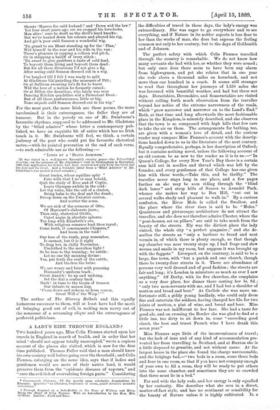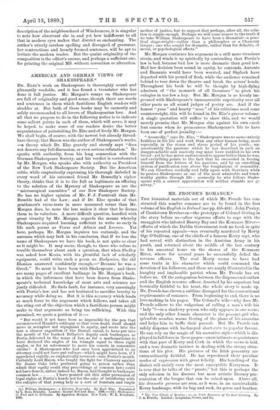A LADY'S RIDE THROUGH ENGLAND.f Two hundred years ago, Miss
Celia Fiennes started upon her travels in England in search of health, and in order that her mind " should not appear totally unoccupied," wrote a copious account of the places she visited, which is now for the first time published. Thomas Fuller said that a man should know his own country well before going over the threshold ; and Celia Fiennes, enlarging on the same idea, says that if ladies and gentlemen would see more of their native land, it would preserve them from the "epidemic diseases of vapours," and " cure the evil itch of overvaluing foreign parts." Considering
• Consummate Chimzra Cf. the parody upon scholastic disputations by Erasmus. Quzritur " an Chitnzra, bombinans in vacua, possit derorare secundas intentions."
t Through England on a Sule.Saddle in the Time of William and Mary. Being the Diary of Celia Fiennes. With en Introduction by the Hon. Mrs. Griffiths. London Field and Tuer.
the difficulties of travel in those days, the lady's energy was extraordinary. She was eager to go everywhere and to see everything, and if Nature in its nobler aspects is less dear to her than the works of man, she does but express the feeling common not only to her century, but to the days of Goldsmith and of Johnson.
The perfect safety with which Celia Fiennes travelled through the country is remarkable. We do not know how many servants she had with her, or whether they were armed ; but only once does there seem to have been any alarm from highwaymen, and yet she relates that in one year she rode above a thousand miles on horseback, and not more than one hundred in a coach. It seems still stranger to read that throughout her journeys of 1,550 miles she was favoured with beautiful weather, and had but three wet days. Dorsetshire, Devonshire, and Somersetshire are visited without calling forth much observation from the traveller beyond her notice of the extreme narrowness of the roads, which " grow narrower and narrower on to the Land's End." Bath, at that time and long afterwards the most fashionable place in the Kingdom, is minutely described, and she observes that the town is so compassed with high hills that few care to take the air on them. The arrangements for bathing, too, are given with a woman's love of detail, and the curious reader may compare Miss Fiennes's account with the descrip- tions handed down to us in the literature of the next century. Equally comprehensive, perhaps, is her description of Oxford; but it contains nothing novel, unless the following account of an old custom be as new to the reader as it is to us ;—" In Queen's College, for every New Year's Day there is a certain sum laid out in needles and thread which was left by the founder, and every gentleman of that College has one given him with these 'words,—Take this, and be thrifty." The traveller never stays long in one place, and a few pages further on she may be seen riding through the "blind dark lanes" and steep hills of Sussex to Arundel Park, whence she makes her way to Box Hill, " cut out in several walks shady and pleasant to walk in." By a curious confusion, the River Mole is called the Swallow, and the place where the river rises is said to be " Moles." Quaintness and picturesque architecture do not attract the traveller, and she does not therefore admire Chester, where the " pent-houses, set on pillars," are said to take much from the beauty of the streets. Ely was the dirtiest place the lady visited, the whole city " a perfect quagmire ;" and she de- scribes the streets as " only a harbour to breed and nest vermin in, of which there is plenty enough, so that though my chamber was near twenty steps up, I had frogs and slow worms and snails in my room, but suppose it was brought up with the faggots." Liverpool, on the contrary, is said to be a large, fine town, with "but a parish and one church, though there be twenty-four streets in it. There are abundance of persons very well dressed and of good fashion; the streets are fair and long; it's London in miniature as much as ever I saw anything." Of Derby, with its five churches, she complains as a very dear place, her dinner there costing her 5s. 8d.; " only two men-servants with me, and I had but a shoulder of mutton and bread and beer." At Carlisle she was more un- fortunate still, a giddy young landlady, who could only dress fine and entertain the soldiers, having charged her 12s. for two joints of mutton, a pint of wine, and bread and beer. Miss Fiennes was not indifferent to her fare. She had a taste for good ale, and on crossing the Border she was glad to find at a little inn, too dirty to sit down in, some " exceeding good claret, the best and truest French wine I have drank this seven year."
Miss Fiennes says little of the inconveniences of travel; but the lack of inns and of any kind of accommodation pre- vented her from travelling in Scotland, and at Buxton she is a little disposed to grumble, and not without cause. At the largest house in the place she found the charge unreasonable, and the lodgings bad,—" two beds in a room, some three beds and four in one room, so that if you have not company enough of your own to fill a room, they will be ready to put others into the same chamber, and sometimes they are so crowded that three must lie in a bed."
Far and wide the lady rode, and her energy is only equalled by her curiosity. She describes what she sees in a direct, matter-of-fact style, and has no sentiment or sensibility for the beauty of Nature unless it is highly cultivated. In a description of the neighbourhood of Windermere, it is singular to note how observant she is, and yet how indifferent to all that in modern eyes makes that district so enchanting. The author's utterly careless spelling and disregard of grammar, her contractions and loosely formed sentences, will be apt to irritate the modern reader. But the quaint originality of the composition is the editor's excuse, and perhaps a sufficient one, for printing the original MS. without correction or alteration.



































 Previous page
Previous page